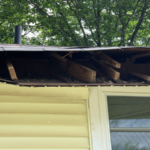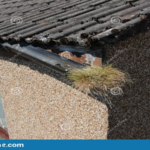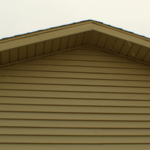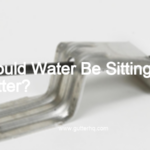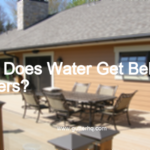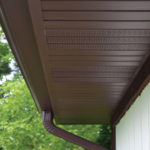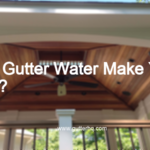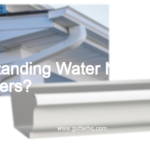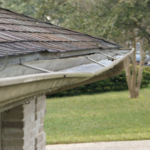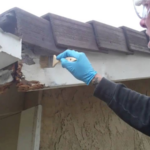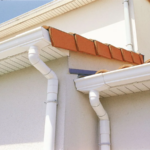There are a few alternatives to gutters, depending on the needs of the homeowner. One option is to install a French drain, which is a drainage system that is installed around the perimeter of the house. This system collects water and directs it away from the foundation of the house. Another option is to install a rain barrel, which collects rainwater from the roof and directs it into a barrel for storage.
What can I use instead of gutters on my house?
A gutter is a channel, or trough, that is placed along the edge of a roof. Its purpose is to collect rainwater and direct it away from the roof and foundation of the house. There are a number of alternatives to gutters that can be used to achieve this same purpose.
One alternative to gutters is to install a rain diverter. A rain diverter is a device that is placed at the edge of the roof. It works by directing the flow of rainwater away from the house and onto the ground.
Another alternative to gutters is to install a rain barrel. A rain barrel is a container that is placed under the downspout of a gutter. It collects the rainwater that would otherwise be directed into the gutter and directs it onto the ground.
Another alternative to gutters is to install a French drain. A French drain is a trench that is dug around the perimeter of the house. It is lined with gravel and has a pipe that carries the water away from the house.
Still another alternative to gutters is to install a perforated pipe. A perforated pipe is a pipe that has holes in it. It is placed at the edge of the roof and the water flows through the holes and onto the ground.
How do you divert rain without gutters?
A French drain is a pipe with holes that is installed at the base of a slope. The pipe diverts water that would otherwise pool at the base of the slope.
A dry well is a hole that is dug into the ground and filled with gravel. The dry well allows water to seep into the ground, rather than pooling on the surface.
A swale is a shallow ditch that is dug along the contour of a slope. The swale diverts water that would otherwise run off the slope.
A culvert is a pipe that is installed under a road or driveway. The culvert diverts water that would otherwise flow over the road or driveway.
A detention basin is a large, man-made pond that is designed to store water. The detention basin allows water to slowly seep into the ground, rather than flowing rapidly into a stream or river.
Is it OK to not have gutters?
- No gutters means one less thing to worry about maintaining.
- Gutters can be a source of leaks and other water damage, so not having them can actually save you money in the long run.
- Some people believe that gutters can actually detract from the aesthetic of a home.
- Without gutters, rainwater can pool around the foundation of your home, which can lead to serious water damage.
- Gutters help to protect your home from wind damage by deflecting gusts of wind away from the structure.
- Leaves and other debris can build up on your roof without gutters, which can lead to serious clogging problems.
How can I control water without gutters?
One way to control water without gutters is to use a rain barrel. A rain barrel is a container that is placed under a downspout to collect rainwater from a roof. The rainwater is then used for watering plants or for other purposes.
Another way to control water without gutters is to use a French drain. A French drain is a ditch that is filled with gravel or other materials. The ditch is then used to collect and redirect water away from an area.
yet another way to control water without gutters is to use a dry well. A dry well is a hole that is dug in the ground and filled with gravel. The hole is then used to collect and redirect water away from an area.
Why do houses in Florida not have gutters?
This is a great question! There are a few reasons why houses in Florida generally don’t have gutters. One reason is that the weather is typically fairly warm and dry in Florida, so there isn’t as much need for gutters to help protect the house from water damage. Additionally, gutters can be a bit of a hassle to install and maintain, so many people in Florida simply don’t bother with them. Finally, some people believe that gutters can actually do more harm than good in Florida because they can collect leaves and other debris, which can then lead to problems with pests or mold.
How do I stop rain water from pooling in my yard?
- If you have a problem with water pooling in your yard, there are a few things you can do to try to alleviate the issue.
- First, make sure that your gutters and downspouts are clean and clear of any debris. This will ensure that they are able to channel water away from your home and Foundation.
- You may also want to consider installing a French drain. This is a type of drainage system that can collect and redirect water away from problem areas in your yard.
- Another option is to create a swale. This is a shallow ditch that is filled with gravel or other drainage material. It can help to redirect water flow away from areas where you don’t want it to pool.
- If you have any areas in your yard that are particularly low-lying, you may want to fill them in with dirt or another type of material to raise the level and help with drainage.
- Finally, make sure that you are watering your plants and lawn evenly. Over-watering can lead to problems with pooling, so be sure to water only as much as your plants need.
What can I put around my house foundation to keep the water out?
There are a few things you can do to keep water out of your home’s foundation. One is to install gutters and downspouts to direct water away from the house. Another is to make sure that the ground slopes away from the foundation. You can also install a french drain or other type of drainage system to collect and redirect water.
Do rain chains actually work?
The answer is yes and no. While rain chains can certainly be effective in directing rainwater away from your home, they aren’t necessarily the most practical solution for everyone.
If you live in an area with a lot of rainfall, or if your rain gutters are particularly prone to clogging, a rain chain may not be the best way to keep your home dry. However, if you’re simply looking for a way to add a little extra charm to your home’s exterior, a rain chain can be a great option.
How do I redirect water away from my foundation?
If your home is in danger of flooding, you may need to take action to redirect water away from your foundation. This can be done using a variety of methods, depending on the severity of the problem.
One way to redirect water away from your foundation is to create a drainage ditch around the perimeter of your property. This ditch should be sloped so that water flows away from your home. You can line the ditch with rocks or gravel to help prevent erosion.
Another way to redirect water away from your foundation is to install a French drain. This is a perforated pipe that is buried in a trench around your foundation. The pipe drains water away from your home and into a nearby drainage system.
If you are having serious problems with water flooding your foundation, you may need to consult with a professional. They can help you determine the best way to redirect water away from your home and protect your property from future damage.
Final Word
There are a few alternatives to gutters that can be used to protect your home from water damage. These include installing drainage systems around your home, using rain barrels to collect water, and planting trees and shrubs that will help absorb water. While these alternatives may take some extra time and effort to implement, they can be well worth it in the long run to keep your home safe and dry.

